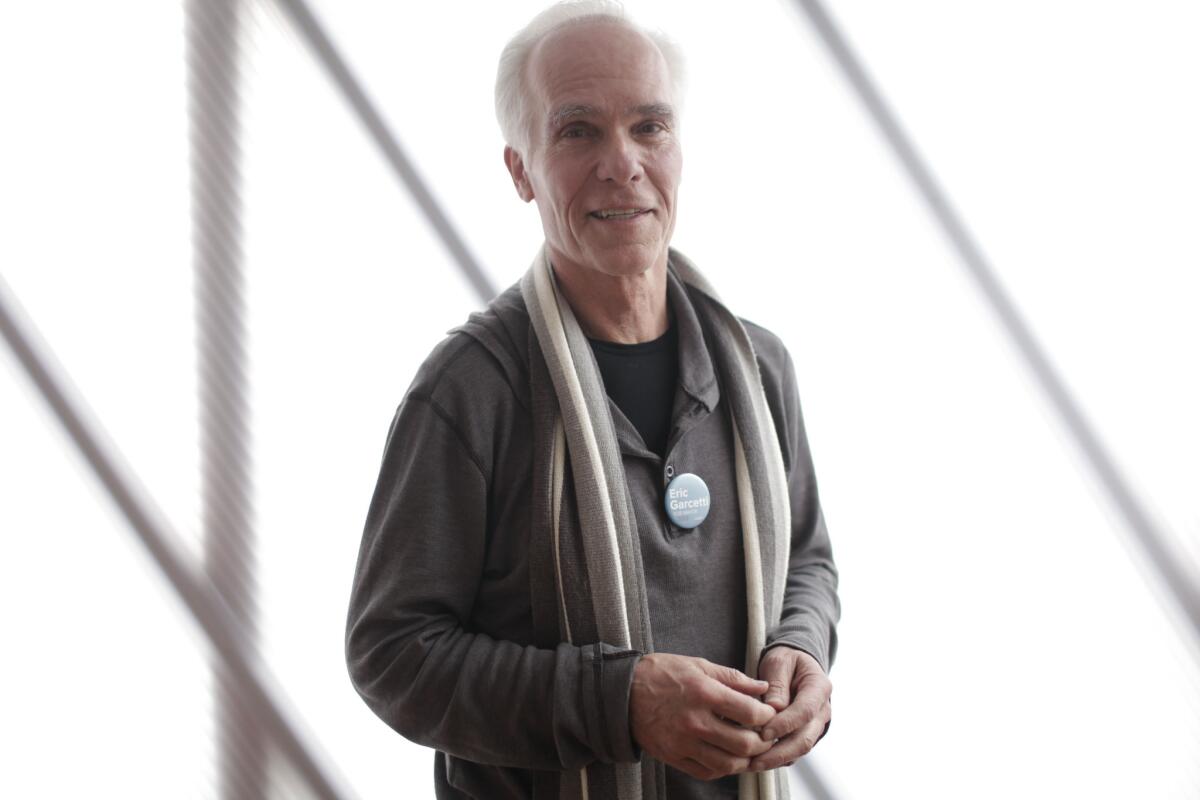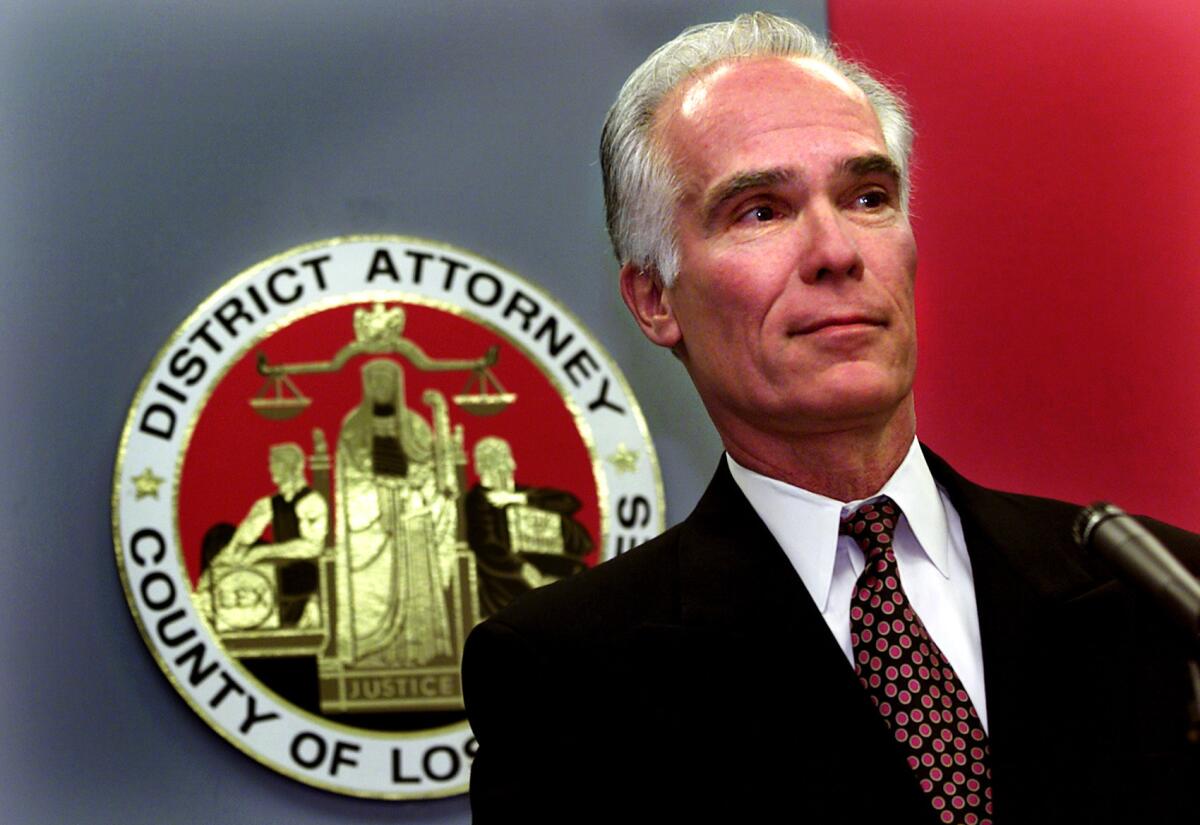The (sort-of) regrets of Gil Garcetti: ‘O.J.: Made in America’s’ reluctant star witness

- Share via
Reporting from NEW YORK — Gil Garcetti looked tanned and relaxed, surprising given the schedule he’d been keeping.
“I got in at 2:30 a.m. yesterday,” the former district attorney of Los Angeles said, with a hint of boast. “I would have taken a different flight, but I had to give a lecture in L.A.”
Several hours after he arrived, Garcetti had gone straight to ABC’s “Good Morning America,” the start of a 40-hour media sprint that would also include “World News Tonight,” “Today,” “Inside Edition,” the New York Daily News, phone interviews back home with the likes of KNX radio and KTLA TV, plus a host of ESPN radio hits. It was all to promote his appearance in “O.J.: Made in America,” Ezra Edelman’s five-part docuseries revisiting the fallen football star that airs on the sports network this week.
The media blitz marks a shift for Garcetti, long the mystery man at the center of the O.J. Simpson case. Exactly 22 years ago this month, Garcetti’s office brought double-murder charges against the celebrity athlete after the death of Nicole Brown and Ronald Goldman — kicking off the most-followed trial of the modern era, the high theatrics of lead prosecutor Marcia Clark and defense attorney Johnnie Cochran and, of course, a controversial acquittal.
Garcetti was visible during that period; it’s hard to forget his post-verdict news conference (“This was an emotional trial, and apparently [the jury’s] decision was based on emotion”). But he vowed not talk of it after it was done — no book, no big broadcast sit-down, not much of anything really, even as many others spoke out and cashed in.
That’s all been changing in the last week, and Garcetti, his signature white hair smoothly in place and a bag from a shopping excursion in hand, seemed to be reveling in the attention. The former official has regrets (a few), shrugs (more) and explanations (many).
Some in the black community felt I was criticizing black jurors. But I don’t regret saying what I did.
— Gil Garcetti
As he eschewed his usual glass of white wine to sit in the upstairs section of a midtown restaurant — “We’re just going to hang out,” he said as he smiled persuasively to a waitress who had come over to say the section was closed — Garcetti offered his view of those turbulent mid-’90s events.
To some critics of the Simpson verdict, the D.A. was given a raw deal, saddled with a case all-too-difficult to win; to others, he was the direct reason for its failure. But if any sensitivity over his place in those crosshairs remained with him, he didn’t let on. “The evidence was just so overwhelming,” Garcetti said coolly. “This case was an aberration.”
But there were, he added, “other things in play that I didn’t appreciate the time. There were a lot of black people in Los Angeles that had seen the injustice in Rodney King. And the black community was still upset with me.”
He recalled how, moments after the trial, “I said ‘clearly [the jury] did not deliberate.’ We had months of evidence and they deliberated for two or three hours. Some in the black community felt I was criticizing black jurors. But I don’t regret saying what I did. Maybe I should. Maybe I should have said less. Maybe some D.A.s would have said less.
“But then,” he said after a pause and another smile, “maybe some D.A.s would have said more.”
“O.J.: Made in America” goes far beyond legal issues to examine the case’s sociological implications. Garcetti, for many, embodies the white justice system, but he actually is of Mexican heritage from both parents’ sides, offering one more contradiction in an episode filled with them.
That has not stopped many from offering criticisms over the O.J. prosecution’s perceived bungles. Garcetti has responses for them.
He waved aside the idea, for instance, that he should have kept the trial in Santa Monica instead of moving it downtown, with its higher proportion of African Americans in the jury pool. (“It’s a false argument — it would have been a countywide selection.”)
He said he thinks Judge Lance Ito did his team no favors. (“You can certainly see from the film the great role he had.”)
The former D.A. does regret, he said, the decision to allow cameras in the courtroom. (“Horrible mistake. You see how it affects everyone, from the jurors to the judge.”)
Garcetti made sure to mention that he was in favor of prosecutor Bill Hodgman trying the case instead of Clark. He wasn’t a fan of Clark’s decisions during jury-selection either, “but she had success with African American women of a certain age convicting black men.”

The L.A. native said he has had no contact over the last 20 years with Clark, who depending on your view of the prosecution was either made the punching bag for the office’s mistakes or was squarely responsible for them.
The Garcetti name has, of course, been in the news in the last few years far more because of his son. It was L.A. Mayor Eric Garcetti, in fact, who persuaded Gil to break his silence for Edelman’s film. The mayor knew the director’s brother from graduate school and told the elder Garcetti that it was time his father offered his version of events; the filmmaker, he said, could be trusted to capture the nuance. Initially skeptical, the former D.A. eventually agreed.
“I had nothing to lose. I was not running for office again — I’d already been kicked out once [in 2000] so that was over and done with,” he said. “I was still anxious during the interview process because I had enough experience with reporters and filmmakers leaving out something or making it seem like I’d said something I didn’t. But Ezra told me what he wanted to do and it sounded extraordinary. It didn’t sound like another FX-type rehash.”
(Garcetti is not entirely a fan of FX’s “The People v. O.J. Simpson: American Crime Story.” “I’m not impressed with things like that, the invented dialogue and drama. I was impressed with the quality.” He did speak to actor Bruce Greenwood, who portrayed him, after the actor got in touch. Edelman, on the other hand, has made a piece with “great intellect and sensitivity and passion.”)
The ex-prosecutor said that what hindsight has given him is a better understanding of the case’s racial currents. “I realized them at the time, but I didn’t have a full appreciation,” he said.
Was it really possible, just a few years after Rodney King, that the black community’s collective sense of anger and injustice was not previously apparent? “I think I just didn’t realize how deep it went,” he said, then added, “I think this movie punctuates the depth of those feelings — this is not about one instance of injustice, of a black man convicted or a white man not convicted.”
Garcetti said he didn’t actually believe he’d get a guilty verdict in the O.J. case. He thought a hung jury was probable, and that the time before a new trial would either yield additional evidence or simply diminish sympathy for Simpson.
Edelman, who interviewed Garcetti for nearly four hours for the film and has also spent some time on the promotional tour, told The Times that “my experience with Gil from the time I spent with him is a guy who frankly is unflappable and is simply cool.”
“There is,” the self-admittedly complicated director added, “an ease to his existence that I’m envious of.”
Garcetti, who turns 75 in August, has been living a quieter second life. He has published a number of photography books (while in office, he would sometimes carry a camera with him). He works as a consultant on the TNT drama “Major Crimes,” as he did on its predecessor, “The Closer.” He serves as a UNESCO ambassador on clean-water issues.
He said he has not talked to Eric much about the case or the series. But he does hope lessons can be imparted to his family in other ways. “I have twin 13-year-old grandsons,” he said, referring to the children of his daughter, Dana Garcetti-Boldt. “I hope to sit down with them and watch each episode of this and talk to them about what it means in the history of Los Angeles.”
Shortly after, Garcetti stepped out of the restaurant and into a waiting Uber, ready to take him to another radio interview.
‘O.J.: Made in America’
Where: ESPN
When: 6 p.m. Wednesday, Friday and Saturday
MORE:
Sundance 2016: The director of ESPN’s ‘O.J.: Made in America’ finds new ground on Simpson
Why ‘O.J.: Made in America’ might be the first television show to win an Oscar
‘O.J.: Made in America’ is a movie so compelling you want it never to end ... even at 7-plus hours
For the VR generation, the differences between TV and the movies may already be irrelevant
Follow me on Twitter: @ZeitchikLAT
The complete guide to home viewing
Get Screen Gab for everything about the TV shows and streaming movies everyone’s talking about.
You may occasionally receive promotional content from the Los Angeles Times.




